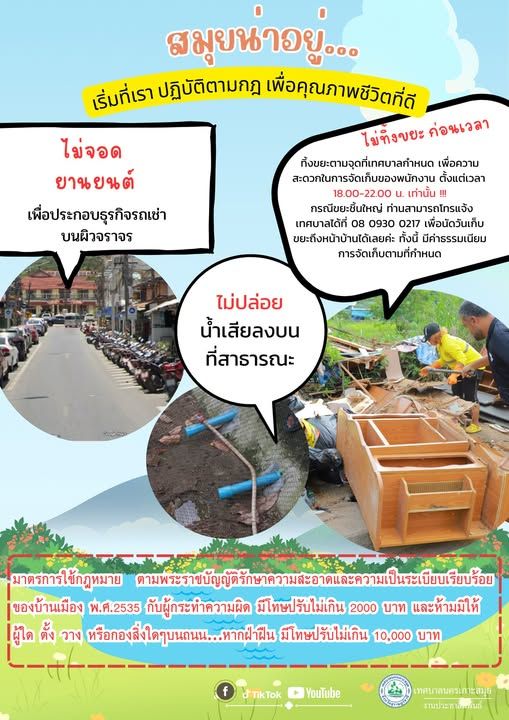Here’s the summarized version for Instagram:
Today is Municipality Day in Thailand, celebrating the incredible local governments that have transformed community services since 1989! 🇹🇭 From public health to infrastructure, these local heroes work tirelessly to make our cities and towns better places to live. 💪🏼🏙️
ThailandTravel #LocalGovernment #MunicipalityDay #ThaiCommunities #CityLife #TravelThailand #UrbanDevelopment #ThailandTourism #LocalHeroes #CommunityService
Municipality Day is observed annually on April 24th in Thailand. This day was officially recognized by an announcement from the Ministry of Interior on July 4, 1989. Its purpose is to highlight and honor the important role that municipalities play in the country’s system of local administration.
The Historical Development of Local Administration
The Era of King Chulalongkorn (Rama V)
The roots of municipal administration in Thailand date back to the reign of King Chulalongkorn (Rama V). In a bid to modernize the nation’s administrative structure, King Rama V introduced the concept of local governance. The first significant step was the establishment of the sanitation district, known in Thai as “sukhaphiban.” This initiative began with the creation of the Tha Chalom Sanitation District in Samut Sakhon Province on December 18, 1898. The primary aim was to improve public health and sanitation standards in rapidly growing communities.
Transition to Democracy and Legislative Developments
A pivotal change occurred in 1932 when Thailand transitioned from an absolute monarchy to a constitutional democracy. The new government sought to decentralize administrative power and foster greater participation at the local level. In 1933, the Act on the Administration of the Kingdom of Thailand was passed, paving the way for comprehensive local governance reforms.
On April 24, 1933, the Municipality Act was enacted. This legislation transformed several existing sanitation districts into municipalities, broadening their administrative responsibilities and granting them greater autonomy in managing local affairs.
Legal Evolution of Municipalities
Amendments and Reforms
Since its inception, the legal framework governing municipalities in Thailand has undergone several amendments, reflecting the nation’s evolving political and administrative landscape. Different governments have enacted, amended, or repealed various laws to refine the structure and authority of municipalities.
The Municipality Act of 1953
A significant milestone was reached with the Municipality Act of 1953. This act consolidated and replaced earlier laws, establishing a uniform and robust legal foundation for municipalities as formal local government organizations throughout the country. This legal clarity allowed municipalities to more effectively manage local services, development, and public welfare.
Role and Significance of Municipalities in Modern Thailand
Municipalities are crucial in Thai society, as they are charged with delivering essential services such as waste management, urban planning, public health, education, and infrastructure maintenance. They serve as an important link between the central government and local communities, promoting grassroots participation and responsiveness to local needs.
Municipality Day serves as a reminder of the evolution and importance of local governance, celebrating the progress made and the ongoing contributions of municipalities to Thailand’s development. The observance encourages civic engagement, public awareness, and appreciation for the efforts of local administrative organizations.
Observance and Public Awareness
Across Thailand, Municipality Day is marked by a range of activities organized by local governments, educational institutions, and community groups. These may include public hearings, exhibitions, seminars, community service projects, and campaigns to educate the public about the functions and achievements of municipalities.
The day provides an opportunity for citizens to engage with their local government, learn about their rights and responsibilities, and become involved in shaping their communities. It also serves as a platform for local officials to highlight initiatives, report progress, and solicit feedback from residents.
Municipalities and Local Development
Municipalities play a central role in fostering sustainable development at the local level. They are responsible for implementing urban policies, promoting environmental protection, supporting economic growth, and ensuring equitable access to services. Through coordinated planning and active community participation, municipalities help to create livable, vibrant, and resilient urban and rural areas.
The celebration of Municipality Day not only commemorates historical milestones but also reinforces the value of local governance in Thailand’s broader development agenda.
Frequently Asked Questions
“`markdown
FAQ: Municipality Day in Thailand
What is Municipality Day in Thailand and why is it celebrated?
Municipality Day, observed annually on April 24th, honors the crucial role municipalities play in Thailand’s local administration. Established in 1989, this day celebrates how local governments have improved community services—such as health, infrastructure, and public welfare—since their origins in the late 19th century. It aims to raise public awareness and appreciation for these essential organizations that make cities and towns better places to live.
How did municipalities develop in Thailand, and what legal milestones have shaped their role?
The roots of local governance in Thailand trace back to King Chulalongkorn’s reign (Rama V) with the establishment of sanitation districts in 1898. Major legal milestones include the 1933 Municipality Act, which decentralized local authority, and the Municipality Act of 1953, which provided a standardized legal framework for municipalities. Over time, various amendments have further refined their powers, ensuring municipalities can effectively manage development, services, and public welfare.
How is Municipality Day observed, and what is its importance for local communities today?
Municipality Day is marked by activities such as exhibitions, seminars, community service, and public hearings organized by local governments, schools, and civic groups. The day encourages citizens to engage with local officials, learn about municipal functions, and participate in shaping their communities. This observance highlights the ongoing contributions of municipalities to sustainable local development and fosters greater civic responsibility and involvement.
“`




